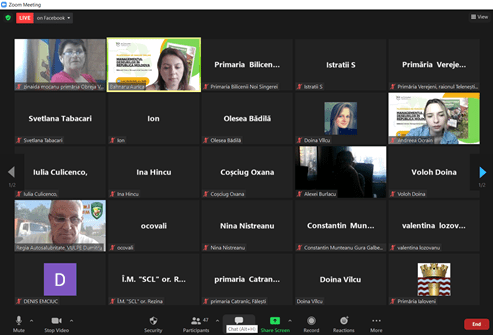On Monday, August 9, the Waste Recovery Association, on the occasion of the publication of the 30th issue of the "Waste Management" Magazine, launched the first edition of the Online Dialogue Platforms "Waste Management in the Republic of Moldova". This event aims to sensitize people to the wide range of topics covered in the magazine, the correct information in relation to the legal framework and, of course, the possibility of real-time interaction with invited specialists or members of the association. The editorial team is motivated to spread the information presented in the quarterly writings as efficiently and interactively as possible.
The platform was designed as a tool for communication and direct development of a community of people and institutions responsible for the environment and waste management. Respectively, in the first edition, we had as guests representatives from the Movca Association, the College of Ecology, Apa Canal Moldova, the Vinum company, etc. Special guests who were also written about in magazine no. 30 told us their tangential experiences of waste management, along with the benefits and impediments in this regard.
The first topic according to the Agenda was the presentation by Mrs. Rodica Guzun, College of Ecology of a new occupational standard – Environmental protection technician, approved and carried out in coordination with the Ministry of Health, Labor and Social Protection. This is one of the steps that gives us the opportunity to modernize the entire professional training curriculum within the College of Ecology"
Mrs. Aurelia Bahnaru, continued with the presentation "Management of used tires", emphasizing "Tyres that end up as waste do not biodegrade in nature. The supposed decomposition time is around 600 years, being a constant source of pollution. Traditionally, this rubber is burned. This practice is absolutely harmful. As a result, approx. 23 dangerous chemical substances, carcinogenic compounds... We must understand that used tires represent a source of secondary matter that, through recycling or reuse, can be maintained in the national economic circuit". In summary, tires can continue their lives in other forms, causing insignificant damage to the environment.
In the Waste Management section of the magazine, there is a vast material dedicated to wine bottles and the waste resulting from their consumption. As the activity in the field of wine production and export has a considerable weight in the country's economy, people working in this field should know about the environmental damage caused by the manufacture and sale of wine bottles. In general, glass is a sustainable and 100% recyclable material, but it is not biodegradable. In Moldova, the bottle collection infrastructure is fragile and should be supported by an eco-friendly behavior of wine producers. To inform about the reuse practices of wine packaging, we invited "Vinum" estate to the Dialogue Platform "At "Vinum", we decided to collect the sold bottles. To achieve this goal, we took a marketing step: offering a discount on the next bottle of wine purchased when presenting the collected packaging." – Vladlen Ujacov, director of "Vinum" Estate.
A new column left on the pages of the magazine is Extended Manufacturer's Liability. Namely, this mechanism proved to be an absolutely necessary and functional tool for the transition to a circular economy, being directly focused on application of the "polluter pays" principle, according to which whoever introduces packaging or packaged goods into the market of a country remains responsible for it until the end of the life cycle of the packaging, including the period of time after disposal.
Arcadie Rusnac, representative of Apa-Canal, reported the following about the subject of disposable hygienic products and their damage to nature and the economy: "Disposable wet wipes and other waste of that type represent a very big problem for sewerage networks, because the housing systems and pumping stations are clogged. Disposable hygienic products, including masks, clog the grills at sewage treatment plants, for example. Many citizens still consider it normal to divert everything we no longer need into the sewage system. Currently, we store this waste at the station because there is a waste management program in the enterprise. This program envisages the fermentation of sludge in methane tanks, producing biogas. We remind you that sludge is also considered waste." In general, the problem of menstrual products, wet wipes and disposable diapers remains a current one in the Republic of Moldova. As this topic is rarely talked about, many nuances regarding the risk to health and the environment remain unknown to consumers.
Live zoom event can be found here: https://fb.watch/7mt2brNBRb/

